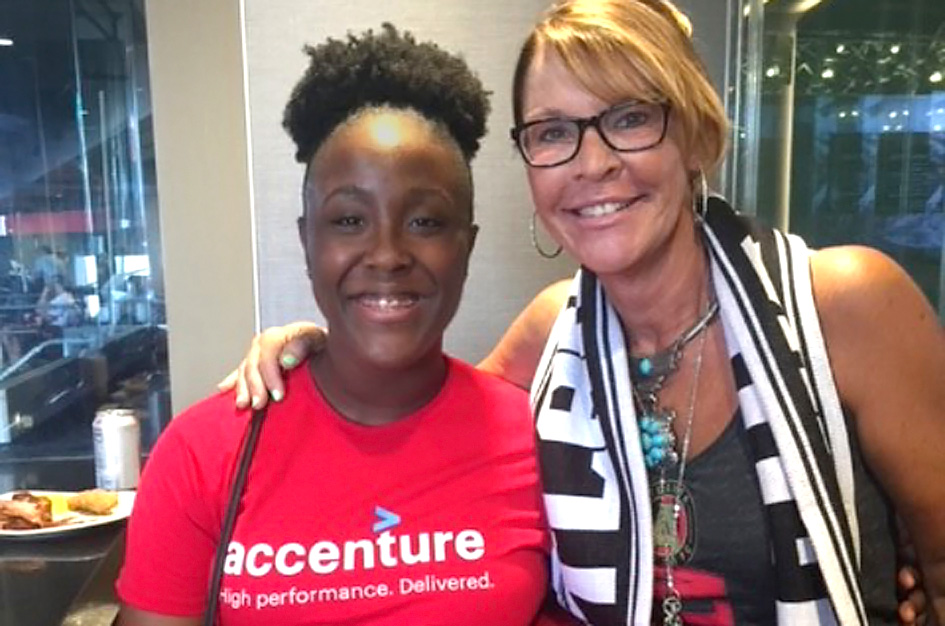Boys & Girls Clubs of America celebrates the power of caring, adult mentors all year long, but especially in January during National Mentoring Month. Youth thrive with support from a mentor, teacher or guide that notices them and their potential. For kids who lack a positive role model, more than 400,000 trained staff and volunteers at Boys & Girls Clubs across America help young people chart a path and grow into confident, capable adults.
During National Mentoring Month, we talked to Virginia Lawley, senior director of college and career readiness for Boys & Girls Clubs of Metro Atlanta, about the power of mentorship. Virginia has more than 10 years of experience with Boys & Girls Clubs. Here’s what she had to say.
In your own words, what is mentorship?
Mentorship is the gift of time and self that a more experienced person gives to someone who is seeking knowledge and new experiences. Mentors can represent a variety of ages, backgrounds and careers. They just need to have a genuine interest in sharing their knowledge and experiences to support a young person charting their future.
How has mentorship personally impacted you?
I have been extremely fortunate to learn from multiple mentors throughout my life. Most importantly, two wonderful ladies mentored me during high school when I had no plans to attend college. I felt that my family didn’t have the resources to send me to college, but my mentors helped me plan, prepare and even pay for the college entrance exam and application fees. I attended Kent State University and became the first person in my family to graduate from college.
What are some of the biggest issues youth are facing today?
Youth have an inordinate number of pressures due to historical challenges such as education gaps and income disparities as well as current issues that exacerbate existing challenges. Not only are youth today trying to figure out their education and career plans, but they also are coming of age during a turbulent time in our nation’s history. Navigating a racialized and polarized world with the backdrop of a pandemic makes for a heavy load for young people trying to determine how they can make a positive change in their communities.
How do mentors make a difference?
Mentors empower teens for success. These adults can be empathetic listeners as well as informative voices in the creation of action plans. When teens feel heard and understood, they are genuine about their hopes and fears. When they feel respected, they become deliberate participants in being the architects of their own futures.
How do Club staff and volunteer mentors at Boys & Girls Clubs help young people as they chart a path toward a successful future?
Caring staff in Clubs become trusted allies and mentors for our youth. Not only can they share their experiences, opportunities and empower young people, but they can be fierce advocates on behalf of youth. We should not expect young people with little life experience and developing life skills, to face adversity alone. It’s our duty to support and advocate for the issues we know will support future generations.
Why is mentorship vital for guiding young people to become work- and life-ready after high school graduation, whether they pursue college, the military, a trade or a career?
It’s our job as mentors to enable young people to build the skills they need to succeed. As the old saying goes “You don’t know what you don’t know”. Youth need access to as many resources and caring adults as we can provide. When mentors share lessons from their own journeys, young people begin to see how they can chart their own course. With demands upon schools, families and nearly every aspect of life, young people need genuine relationships built on trust that they can turn to for guidance.
Why does America need more mentors? How can mentorship help form a generation that is prepared with life skills and work skills?
Mentors are a critical resource for young people, and one not often referenced when speaking of under-resourced communities. Local professional networks can be the first opportunities young people have with mentors. I have had the pleasure of watching first-hand how a mentor can open one door which leads to another. We have Boys & Girls Club alumni in successful, high-demand, high-paying jobs that would not likely have had access to those opportunities without a ladder of mentors and support networks.
What’s the most effective way for mentors to maintain relationships with young people as the pandemic continues to limit face-to-face interaction?
Although virtual meetups cannot replace in-person interaction, regular contact and encouragement is more meaningful than ever. It’s important to maintain the original purpose of the mentorship, if possible, but also remember that a note in the mail, a phone call to say ‘Congratulations,’ or a group text can be the joyful spark in a difficult day for a young adult.
What advice do you have for caring adults who would like to start turning their concern for the wellbeing of young people into action?
Figure out something you are passionate about. In all likelihood, one of our Club kids has a similar passion. Keep in mind that you are likely to learn as much as you teach. A shared interest or passion often ignites the next generation to take up the charge and run with it.
Are you interested in becoming a volunteer mentor at a Boys & Girls Club? Find a Club in your area and contact them today.




